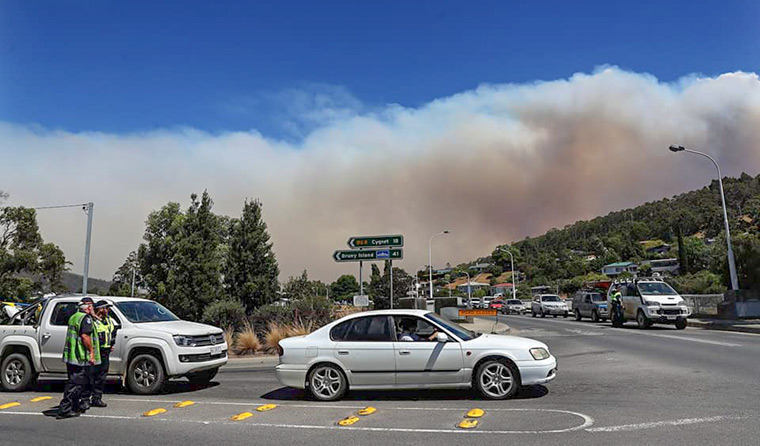News
GPs lead community response to devastating Tasmanian bushfires
Recent rain has brought relief, but GPs will likely be dealing with the fallout for a long time to come.
 Wildfire south of Huonville in southern Tasmania. (Image: Rob Blakers)
Wildfire south of Huonville in southern Tasmania. (Image: Rob Blakers)
To date, more than 195,000 hectares of land have been consumed by a series of infernos that have been burning since December.
Seven houses have been lost, while more than 750 volunteer firefighters and 38 aircraft have been working day and night to try to contain the impact of the largest fires seen in Tasmania in over 50 years.
Fires have been blazing in many parts of the state, but the risk to lives and homes has been particularly pronounced in the Huon Valley, a rural area of around 17,000 people about an hour southwest of Hobart.
Huonville GP Dr Jessica Shill, who helped coordinate the primary care response at her practice and the region’s evacuation centre, told newsGP the crisis flared up on the Friday before the Australia Day long weekend. Instead of planning for a weekend of barbecues and catching up with friends, families were forced to hurriedly gather what little they could and flee a wall of flames that threatened all in its path.
The next week was one of anxiety and uncertainty for local residents, more than 150 of whom were permanently camped at the Huonville evacuation centre as fluctuating conditions and 40 km/h wind gusts resulted in sometimes-conflicting messages about the danger posed by a wildly unpredictable fire front.
‘You could see the fires from the clinic … it was definitely a constant presence while you were working. They were close enough that you were aware of them all the time,’ Dr Shill said.
‘You could [also] see flames coming over the ridge from the evacuation centre.’
While the majority of presentations were smoke-related and physical injuries were limited, Dr Shill said one family had lost its home and many others experienced prolong periods of anxiety and uncertainty that had taken a toll.
‘What’s really surprised me is how drawn out this whole experience has been,’ Dr Shill explained.
‘By the Friday after the first warning [a week prior], people were really a bit over being worried, they can’t mount that anxiety response anymore.
‘Having the normality of coming in to see their GP, and just going about everyday life in that regard has been a big source of comfort for a lot of people.’
As such, efforts to look after the community are ongoing.
‘What comes to mind are people who have actually lost property,’ Dr Shill said.
‘We’re getting some training for the staff around how to respond to disaster situations … [and] there’s an ongoing bushfire recovery team, which we’re a part of, to work out what the community is going to need going forward from this situation.’

Huonville GP Dr Jessica Shill could see the approaching fires from her clinic. ‘It was definitely a constant presence while you were working,’ she said.
Even though anxiety in the area has been palpable, the other noticeable result of the disaster is the sense of community spirit that has been generated.
‘One of the great things about living in a small community is that we’re really protective, and during these sort of events everyone is so understanding and really pulls together,’ Dr Shill said.
‘I’ve worked in city-based general practices in the past, but what’s really struck me is that when these kind of things happen the general practitioners and the staff are really considered part of the community.
‘We had at least four of our nurses who were evacuated staying with other staff members. While it was a bit challenging, certainly anyone who needed to leave was accommodated, and the community and patients were equally as understanding of us as we were of them.
‘Patients are hugging nurses and doctors, and I think a lot of the role of the general practice is just being that place where people feel that they can come for reassurance and comfort.’
Warnings have now been downgraded to alert level ‘watch and act’, and the evacuation centre has been shut down. But with more hot weather predicted in the coming weeks, there is no way of predicting when the next major fire event could occur.
But while the danger remains, so does the sense of camaraderie and community.
Dr Shill says it is this tight-knit aspect of country life that will guarantee she and her partner will be Huonville residents for years to come – despite such a harrowing experience within the first 12 months of moving in.
‘We love it,’ she said.
‘We’re definitely here to stay.’
bushfire disaster relief recovery Tasmania
newsGP weekly poll
Health practitioners found guilty of sexual misconduct will soon have the finding permanently recorded on their public register record. Do you support this change?